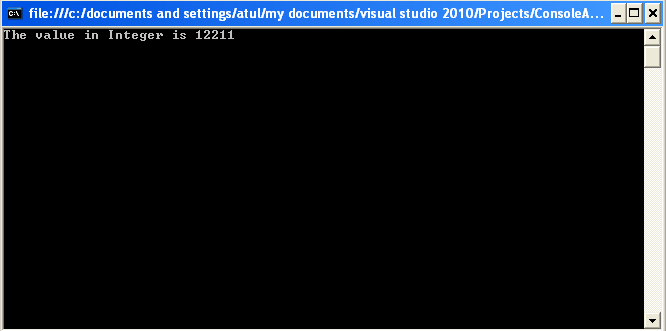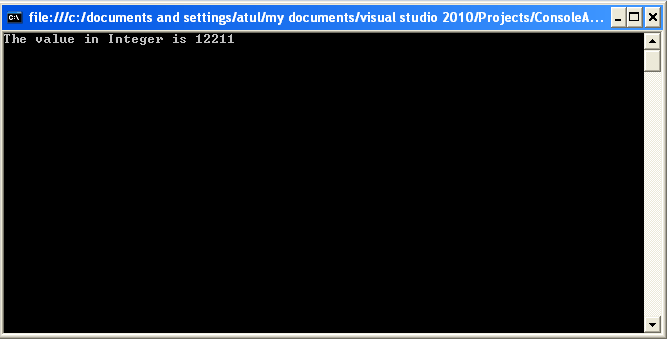Data Conversion in Visual Basic .NET
In this article, I will explain you about Data Conversion in Visual Basic .NET.
In this article, I will explain you about Data Conversion in Visual Basic .NET.
Data Conversion
In Visual Basic .NET, when we need to convert the data type of a variable as the program proceeds, we use data conversion to convert one data type to another. We have two ways to convert data implicitly and explicitly.
Implicit Conversion
Implicit conversion is referred to the conversion that performed automatically. In Implicit conversion compiler convert one data type to another itself. The code below will help you to understand implicit conversion more clearly:
Example:
Imports System.Console
Module Module1
Sub Main()
Dim A As Double
'Declare a variable of Double data type named A
A = 12211.12211
Dim B As Integer
'Declare another variable of Integer data type named B
B = A
'implicit conversion
WriteLine("The value in Integer is " & B)
Read()
End Sub
End Module
Output:

Explicit Conversion
Explicit conversion is referred to the conversion that does not performed automatically, we have to perform the conversion. It also known as casting. CType function is use to accomplished Explicit conversion. The code below will help you to understand Explicit conversion more clearly:
Example:
Imports System.Console
Module Module1
Sub Main()
Dim A As Double
A = 12211.12211
Dim B As Integer
B = CType(A, B)
'two arguments, type we are converting from, to type desired
WriteLine("The value in Integer is " & B)
Read()
End Sub
End Module
Output:

The list of conversion functions which we can use in Visual Basic .NET.
|
Functions
|
Use
|
|
CInt
|
This function convert to Integer data type.
|
|
CChar
|
This function convert to Char data type.
|
|
CString
|
This function to convert String data type.
|
|
CShort
|
This function convert to Short data type.
|
|
CDbl
|
This function convert to Double data type.
|
|
CLng
|
This function convert to Long data type.
|
|
CDec
|
This function convert to Decimal data type.
|
|
CBool
|
This function convert to Bool data type.
|
|
CByte
|
This function convert to Byte data type.
|
|
CDate
|
This function convert to Date type.
|
|
CObj
|
This function convert to Object type.
|
|
CSng
|
This function convert to Single data type.
|
Summary
I hope this article help you to understand Data Conversion in Visual Basic .NET.